- Home
- Mark Zubro
Pawn of Satan Page 17
Pawn of Satan Read online
Page 17
“No,” Graffius said. “The Abbot, Master of Novices, Formation Director, all that sort always had their own private rooms with accommodations. They mostly lived in the most ancient section. Even when the dorms were built, they did have private washrooms for the priests who had higher positions in the Order.”
Demarco said, “One room in Kappel’s suite had seven three-drawer file cabinets filled with papers. All neatly organized, labeled, color coded. A lot of it was pretty ordinary. A few gay porn magazines that I shredded. I took the sheets off the bed, checked under the mattress, examined the floor under the bed. I went through all the pockets in the clothes. I was told to bring anything I found in his pockets or that was hidden to the Abbot immediately.” He placed the black briefcase on his lap and opened the lid. “I couldn’t take very much stuff because I was afraid someone would see me. It was very early in the morning but a lot of the men keep irregular hours and they might be up and around and spot me.”
Graffius interjected, “And they would tattle. They’d think it would get them in favor with the Abbot.”
“How would a random priest know he was taking something he wasn’t supposed to?”
Graffius shook his head. “Do not underestimate the prevalence of paranoia and back stabbing.”
Demarco continued, “I saved a lot of what looked to me like personal things. Irreplaceable stuff, photos, letters from long ago, that kind of thing. Plus the papers that seemed most relevant to what he was doing nowadays, some big summary.” He shoved the stuff across the scarred oak wooden table. “Here, keep it. The most interesting was in the top center drawer of an old oaken desk.” He reached into the briefcase, pulled out a manila folder, opened it, and angled it so Turner could read the contents.
Turner realized he was looking at a sheaf of papers, about twenty-five of them. Each investigation was listed by organization. The first record dated back to the late eighties. Turner saw pages of small squares with dates, names, and larger squares with what seemed to be summaries. There were columns for date started, people involved, date ended, disposition.
“Does that help in the murder investigation?” Demarco asked.
“I’ll have to go over it. This is real?” he asked. “He kept such a record?”
“Why not?” Demarco asked.
“Wouldn’t his enemies kill to get this?” Turner asked.
“Only if what they were doing involved criminal activity.”
Ian said, “If he kept notes on felonious behavior that would incriminate people, any one of those people might be willing to kill him to get them. Seems kind of a stupid thing to do.”
Demarco objected. “Bishops don’t make stupid decisions like that.”
“What makes bishops so special?” Ian asked. “They’re not human?”
Turner interrupted. “But nobody broke into the Abbey. If these were all just sitting there, if the Abbot wanted to see them, he could get in any time. If he doesn’t have a key, he’s in charge of maintenance. He could just have a work crew break in.”
“So Kappel wasn’t a threat to the Abbot?” Ian asked.
Nobody knew the answer to that.
“Why did you choose to save anything?” Turner asked.
“Ian called.”
Ian said, “Right after I spoke to you outside the station, I called him and filled him in.”
Demarco shook his head. “After the call, I was eager to help with the murder investigation. When they picked me to be the cleanup guy, it made my life a lot easier. From what Ian said, I felt like I was helping the police. Maybe weeding some dead wood out of the Order.”
Turner asked Demarco, “How well did you know Kappel?”
“I certainly knew of him, and I’d met him, but he never really spoke to me. He wasn’t at the Abbey that often. He travelled and there was the condo with Tresca. I don’t think he knew many of the younger priests.”
Graffius’ old voice cracked but he managed to imbue his tone with contempt and a snarl. “Because younger priests were of no use to either one of them.”
Turner asked, “So you knew about the condo they shared?”
Demarco said, “We all did.” Graffius nodded confirmation of this.
“How’d they get away with it?”
Graffius shrugged. Demarco said, “I have no idea.”
Turner asked, “How did the older priests get along?”
“When I joined right out of college, the place was nuts. There were two factions. Still are. I learned the history from before I got there. Once they dumped poor Graffius here, it’s always been Duggan versus the Abbot.”
Graffius added, “I united them for a brief while. All the good it did them.”
“Why do either of you stay in the priesthood?” Turner asked.
Graffius’s hands shook. “I believe in my vows.”
Demarco said, “I’m not sure any more, but that’s not a decision for today.”
Turner glanced at Ian then back to the priest. Demarco blushed. “I’m human. Or at least I’m aware of my flaws. Some call those needs.”
Ian said, “I seduced him and led him into sin.”
Turner said, “I know how that works.”
“You were more than willing.”
Turner sighed. “I’m aware of that.” He remembered the frantic fumbling of his first time with Ian. His first time with a man. It had been exhilarating.
Graffius said, “I’m worried that Bishop Tresca is late. He should have been here more than forty-five minutes ago.”
A distant thundering began. For a moment Turner thought perhaps the storms had intensified, but as a city person, he quickly recognized the rumble of an approaching El train. Within moments the rush of noise intensified to a deafening roar, far too loud for them to hear each other. The train paused in the station next to them. They waited. Moments later, the El roared away and conversation could resume.
Ian said, “As for Tresca, you know how traffic gets snarled when it rains in the city. Or maybe he was on the train that came in.”
Graffius snorted. “A bishop on an El train? I think not.” He shook his head. “I’m worried.”
Demarco smiled. “You always worry.”
Graffius said, “His lover is dead. He should be worried. We all should be worried.”
Turner decided not to add to the worry by mentioning that he’d made the trip from the near southwest side of the city to the mid-north side of the city in the usual time frame in spite of the weather.
Demarco drank coffee then said, “I want the Order to be what it was. I want the Order to be true to itself. I want it back the way it should be. The old guard, both sides, needs to go. Right now it’s a bunch of old men who have been involved in various sets of corruption, strains of corruption. Some of which go back centuries. It needs to stop.”
“Centuries?”
“The secrecy, financial and political chicanery, their attempts to influence society when their doctrines, and threats, and fears of the hereafter don’t work.”
Graffius said, “And then there’s the problem of gay priests.”
“Is there any other kind?” Ian asked.
Demarco said, “It doesn’t matter if we’re gay or straight. Things have to change.”
Ian said, “It matters a great deal to some people.”
Demarco said, “I can only change the bit of the world that I’m a part of.”
Ian said, “And take over the Order and run it the way it should be run with a hot stud by your side.”
Demarco frowned. “Don’t be mean. Your sarcasm will keep you from having a lasting relationship.”
Ian laughed. “Who are you to judge?”
Demarco’s lips set in a firm line. They both sat forward. This didn’t sound like the first time they’d had this fight. Turner wasn’t in the mood to be part of a lover’s quarrel. He and Ian had nasty arguments when they dated. Ian could be a trial. Turner preferred him as a friend not a lover. Although sex with Ian had been the best up unt
il Ben. He asked, “How did Kappel and Tresca get away with their relationship all those years?”
Graffius shrugged. “Power, money, influence, threats, deals, love, sex, any or all of the above and more, I suppose. I don’t know the details.”
Turner placed the briefcase between his chair and the wall. He looked at Demarco. “Thank you for all this.”
“Just trying to help.”
“When we were in the condo, Tresca got a call. He seemed willing to cooperate before the call, but afterward he hustled us out the door. He look frightened. Who would have that kind of effect on him? Who has that much power over him?”
Demarco said, “I don’t know.”
Graffius said, “The Cardinal, the Abbot, Bishop Pelagius, even Vern Drake? Someone with power he was afraid of. I don’t know specifically.”
TWENTY-FIVE
Monday 12:01 P.M.
A commotion at the entrance to the room drew their attention. As the noon hour had approached, the room had begun to fill. None of the new patrons had evinced an interest in them. Tresca, trailed by Melanie the waitress, rushed into the room. He dumped his rain slicker onto the end of the last empty booth on the far side of the room. Then he walked up to Turner and his group and pointed at the detective and said, “We need to talk.” No explanation or apology for his late arrival, barely a glance at the others.
Tresca wore a black sweater vest over a gray long-sleeve shirt, and black jeans.
Graffius said, “Hello, Josh.”
Tresca gave him a half-second nod then said, “I don’t have much time.” He turned to Melanie who had hovered. “Coffee. Black.” He pointed to the booth where he’d thrown his slicker. “Over there.” Without waiting to see if Turner followed, he marched to the booth.
“Charming as ever,” Graffius said.
Turner stood up. “He was closest to the dead man.”
He walked over. The booth was two high-backed old church pews, their short ends flush against the wall. This table top was stained Formica. The shaded lamp attached to the wall illumined a painting of a woodland waterfall. Turner tucked the newly acquired briefcase behind his legs under the pew.
Without preamble, Tresca began, “Those two are losers. Demarco won’t be a priest in a year and Graffius will probably be dead in a year.”
“That’s harsh.” Turner thought Tresca was talking unnaturally fast, but perhaps that was his way. He seemed hunched over enough to be thirty years older than he was. Every minute or so, a muscle under his left eye twitched. He thought the man might be ready for a breakdown.
The priest said, “I’ve faced a lot of realities in my life. That’s just a minor couple of them.”
Turner asked, “Who called you Saturday night at the condo?”
Melanie brought coffee and left. Tresca ignored his.
“Detective, how about for now you let me tell this my way.”
Turner gave him a brief nod but thought, if I don’t outright arrest your ass after this, you’ll be lucky.
Tresca did a three hundred sixty degree turn around the café and eyed each of the patrons suspiciously. He hunched forward. Did he think the church had enough minions to spy on him in every café in the city? Was his paranoia justified? Would he really lose that much if the church found out what he was doing? Then again his lover was dead.
“The Cardinal and the Abbot. Both hated Timothy.”
“I thought he worked for them.”
“He did. And he had the goods on both of them.”
“What kind of goods?”
“Well, the Sacred Heart of Bleeding Jesus Order is going broke. It’s the Abbot’s fault.”
“How so?”
“He’s been skimming. He’s been getting them into bad investments. When the stock market crashed the Order lost even bigger.”
“What’s he got on the Cardinal?”
“The Cardinal was in deep with covering up molestations in his last diocese.”
“We checked that. The cops said they had nothing on that.”
“No, no. When he was a monsignor. He was the third in command, but he was the one directly involved with accused priests. This was all before it made national headlines. He’s the one who got them plane tickets out of town. He’s the one who got them reassigned around this country or on continents overseas. It’s a very big Order. There’s lots of places to send people. You want a priest who’s embarrassed the Order out of the way, send him to Mumbai where the Order has seventeen parishes, runs schools, and orphanages. He mostly got away with it because he was in the Order, not officially part of an archdiocese. It was a very clever cover-up scheme. Timothy found all the records of the priests and the victims.”
“Why didn’t they just transfer Timothy halfway around the planet?”
“They couldn’t. He was controlling them. He was controlling any number of archdioceses and the Order. Timothy had real power, and they were afraid of him.”
“Did he keep any kind of records on his investigations?”
“He said he did. I never saw any. I didn’t have a key to his room at the Abbey. We kept our work lives separate.”
“You were his lover, didn’t he confide in you?”
Turner didn’t tell him he may have the very records he was talking about. Nor that he found it suspicious that Tresca didn’t know Kappel kept records.
“He never got transferred. He always got his way.”
“Got his way about what?”
“We were living together.”
“How’d you guys wind up in the condo?”
“That was Timothy again. He knew how to do deals. He knew the guys who lived there before us. He performed services for them.”
“Priestly or sexual?”
“Does it matter? They’re dead. They couldn’t have killed him.”
“Was the place where we found the body familiar to you or your lover?”
Tresca looked away. Turner suspected a lie for sure was coming.
“Never been there.”
“Had Timothy?”
“I don’t know.”
“He never mentioned it?”
“No.”
“The church owns the land.”
Tresca shrugged.
“Why didn’t the powers that be stop him doing investigations?”
“They couldn’t. Partly he was good. Partly he did help them out and got rid of thorns in their side. Partly he had the goods on them. He was a sort of out in the open double agent.”
“A dangerous game.”
“Up until this weekend he was winning.”
“Besides the Abbot and the Cardinal, who would want to kill him?”
“I don’t know enough about his investigations to say who would be angry enough to kill him.”
“He called you several times that evening. The calls lasted only a minute. What were they about?”
“Just routine schedule checks.” Tresca’s eyes looked away. Turner wondered if the bishop knew he was such an incompetent liar.
“Did he sound worried?”
“No. You have the records from his phone?”
“Yes. Is that a problem?”
Tresca gulped coffee. “Uh… No.”
“Why were you wearing your cassock Saturday night?”
“I’d just come from an official function. I’m stuck attending far more than I care to.”
Turner wasn’t sure he believed much of what he was being told. It just all seemed so smooth, so pat, almost rehearsed, certainly not spontaneous. He switched tacks. “We know he paid escorts. That can be dangerous.”
Tresca turned very red. He hung his head and lowered his voice. “We loved each other for years. I wasn’t perfect. Neither was he.” He looked at Turner. “For however smart he was, Timothy could be stupid about things, maybe naïve is a better word.”
“How so?”
“Say he’d be in a restaurant, and he thought the waiter was cute. He’d go back several times. Or he’d wait for an opening the fi
rst time, and he’d offer the guy money.”
“He didn’t visit web sites?”
“No. He liked the danger of personal contact. He said it gave him a rush to approach a stranger.”
“Wasn’t there a risk they might be hostile straight guys, or at the least that he’d get thrown out of a restaurant or attacked?”
“He never got thrown out, but there was one time at The Proletarian Workers Sandwich Works on Belmont. He gave a guy a hundred dollar tip and told him there was a lot more where that came from. Guy’s name was Hal. He got really angry and tossed his money back at him. Timothy told me about it. He found it exciting. I thought it was embarrassing. It should have been embarrassing. I told him to be more careful. You have to be careful with straight guys. Even in this day and age, they can get very angry, very quickly.” He smiled.
“What?” Turner asked.
“Have you met his brother, Terry?”
“No.”
“Very straight, but back in the seminary he’d beat off for us guys. He’d never let us touch him. He just liked putting on a show. Very friendly, but kind of frigid.”
“Did you ever meet any of the other members of his family?”
“No.”
“Could one of the straight guys he tried to pick up have been angry enough to attack him?”
“I don’t know.”
He and Fenwick would have to visit Hal.
“But him using escorts didn’t make you angry?”
“Why should it?”
“You were living together.”
“We’d arranged things. He had different needs than I did.”
Tresca hunched closer to his coffee cup, glanced at the other table with Turner’s earlier companions. “You can’t trust anybody.” Tresca sipped his coffee.
“Why did he let himself be appointed to all these controversial positions?”
“He wanted to be. He loved being in the thick of intrigue and scandal. Timothy was the kind of man who loved to debate. He loved discussing obscure things such as Roman Canon Law in Reformation England. He could go on about the philosophical implications of liturgical movements and rulings from the fifteenth century.”
“He would have been killed over canon law?” Turner asked.
“Wouldn’t be the first time,” Tresca said.

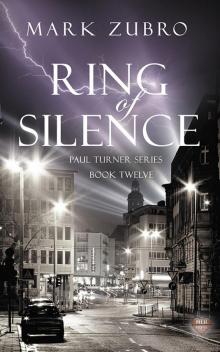 Ring of Silence
Ring of Silence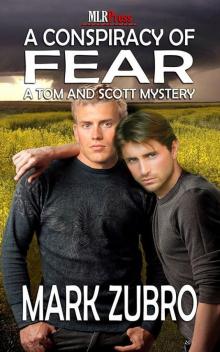 A Conspiracy of Fear
A Conspiracy of Fear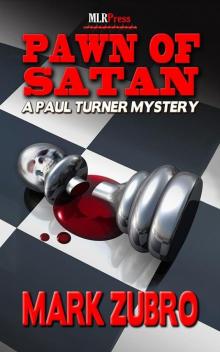 Pawn of Satan
Pawn of Satan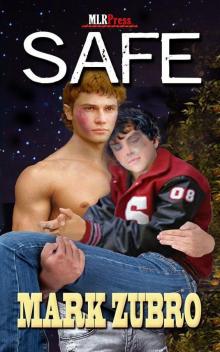 Safe
Safe Another Dead Republican
Another Dead Republican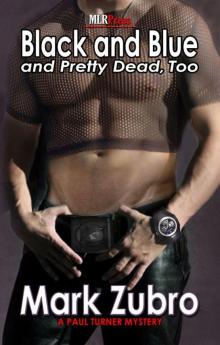 Black and Blue and Pretty Dead, Too
Black and Blue and Pretty Dead, Too Alien Home
Alien Home Dying to Play
Dying to Play Alien Victory
Alien Victory